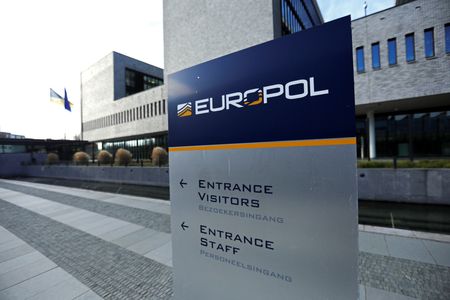BRUSSELS (Reuters) -The European Commission said on Tuesday it will propose expanding the role of EU law enforcement cooperation agency Europol and boosting law enforcement access to data as part of a strategy to improve the bloc’s internal security.
Faced with geopolitical challenges, hybrid threats and more digital crime, Europe is looking at ways to better fight organised crime, improve policing and better combat terrorism.
In its new strategy, the Commission called for more resources for law enforcement and investing in stronger EU agencies.
“We are going to make Europol a truly operational police agency,” European Commission Executive Vice President in charge of security Henna Virkkunen told Reuters.
“Europol, of course, needs more resources,” she said, noting that the agency’s current mandate does not include hybrid threats and sabotage and that in the future Europol will be able to help member countries tackle more types of cross-border crimes.
The Commission plans to adopt a legislative proposal to transform Europol in 2026, according to the new strategy.
Virkkunen also said the Commission is proposing strengthening border agency Frontex and reforming criminal justice cooperation agency Eurojust, as well as helping member countries secure critical physical and digital infrastructure.
“Security is really priority in everything,” the executive vice-president said.
In its strategy, the Commission said it would present a roadmap “on lawful and effective access to data for law enforcement”.
Virkkunen said police and law enforcement bodies don’t have the necessary tools for the digital era.
“But of course, it’s very important that we will have the right balance here, when it comes to privacy and then for the access to data,” she added.
(Reporting by Lili Bayer; Editing by Benoit Van Overstraeten)










